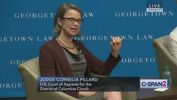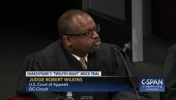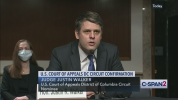Chip
Well-Known Member
- Joined
- Sep 11, 2017
- Messages
- 2,212
- Reactions
- 2,733



I think it’s up next!Wednesday, December 15, 2021 9:30 A.M.
USCA Courtroom 31
Judges Pillard, Wilkins, Walker
21-7038 Jesse Goode v. DC 10 minutes per side
20-5203 Cletus Bohon v. FERC 10 minutes per side
21-1087 Tyler Brennan v. Stephen Dickson 10 minutes per side
NOTE: 10 minutes a side is all they get! Maybe one judge asks one question and its over.
Yeah this is awesome, lots of questions from the judges lets get ready to rumble.I think it’s up next!
I agree it was fabulous discussion. JR did not have his best day BUT I assume 90% of the effort was in the researching and briefing and JR and his team seem to have teed up the 4th A issue perfectly. The FAA lawyer was courteous, smooth and professional but Judge Wilkinson painted him into a corner on a couple of key points.Woah! That was amazing! Sparks flying everywhere! Holy cow! That was more intense than anything I could have ever expected.
My immediate thoughts. Johnathan tanked. He did not sound good, he didn’t seem prepared. But the judges… oh the Judgesabsolutely destroyed the FAA. Was it Judge Wilkinson? That said I qoute, “in that instance I find your rule unconstitutional.” I leaped up out of my chair!
The court also seemed to operate under the understanding that, below the tree line on your property that was outside the limits of FAA authority. Just my take. The Judges pressed the FAA hard to get them to say that they claim authority to regulate that space but the FAA refused to do that. I mean they hammered him to say claim that but he WOUlD NOT say it!
Even the FAA lawyer admitted that they would have to go back and redo the rule!
Amazing!
This is just my interpretation of the video. I’m not a lawyer and I can’t wait to hear what a lawyer says about it but I wanted to get down my thoughts as soon as possible
Yea the Judges seemed to wipe the floor with the FAAs argument that without enforcement action there is no search and called BS on the FAAs argument that the FAA isn’t going to look at the data. If the FAA isn’t going to look at the data what is the pointI agree it was fabulous discussion. JR did not have his best day BUT I assume 90% of the effort was in the researching and briefing and JR and his team seem to have teed up the 4th A issue perfectly. The FAA lawyer was courteous, smooth and professional but Judge Wilkinson painted him into a corner on a couple of key points.
Honestly. If you are flying below the treetops on someone else’s private property I’m ok to call that trespassing I don’t really want somebody flying below my treetops on my property either.Comment from Brendan Schulman on facebook.
"Brendan Schulman
LOTS of questions from the judges on the FAA low-altitude jurisdiction issue, what airspace is “navigable,” minimum safe altitude, “private” airspace below treetops, and drone trespass. If the rule is overturned on the basis that low-altitude airspace is private property outside FAA jurisdiction, brace yourself for endless state, county and local regulation of drone operations. I make no predictions here about outcome."
I for one am not a RID advocate. I would definitely be buying any products that would confound RID output. Transmit my operating location/ Take off point? No way. My Personal ID, drone speed, height, location all being recorded by law enforcement? That's nuts. You could be sitting at home and find yourself getting a fine for something you did with your drone 6 months after the fact. When you get fined in your car your know the when where and how. With RID and a delayed fine, you will likely have no recollection of what you did, when where and how. Defending yourself would be impossible.I see a market for a differential GPS receiver that allows drone operators to transmit signals that offset the drone's internal location solution to something say half way around the globe. GPS signal in + offset gets sent to the IMU - offset location is sent out via RID - all parties are happy.
The drone really doesn't care if it took off at 0.0000,0.0000 or 20.0000,100.0000.
I agree, once you fly below the tree tops or roof top of someone's home, it should definitely be considered a privacy violation.Honestly. If you are flying below the treetops on someone else’s private property I’m ok to call that trespassing I don’t really want somebody flying below my treetops on my property either.
Can you explain what they mean by special needs?Judge Wilkinson asked FAA counsel, does the FAA contend it has jurisdiction down to the ground in someone's private backyard? If so, what is the justification for that? After some hemming and hawing, FAA Counsel said "special needs" exception to the 4th Amendment because the drone might possibly trespass onto someone else's property. I thought the judges received that answer rather skeptically.
The "special needs" exception is an exception to the Fourth Amendment’s general requirement that government searches be supported by a warrant and probable cause. The exception applies when (1) the government conducts programmatic searches that are primarily aimed at advancing some special need other than criminal law enforcement, and (2) the government’s search program is reasonable given the balance of public and private interests.Can you explain what they mean by special needs?
Yes looks like they will post a link to audio. Maybe JR will get a transcript and post it.Is there a recording of this somewhere we can go back to?
We use essential cookies to make this site work, and optional cookies to enhance your experience.

